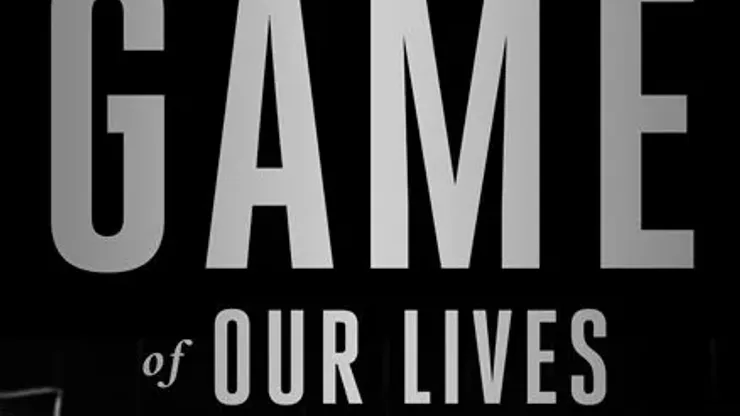Most people around the world get soccer. It comes at them packaged in so many ways for their consumption: on television, online, in print. They get it. It is available all the time. In fact, it is even more than available. It is there to indulge in, to feast on, even to glut on. There are, however, very few people who ‘get’ soccer. It is all in the level of apprehension, of comprehension, of rooted understanding. Manager Arsene Wenger truly gets soccer. As far as players go, Thierry Henry truly gets soccer. As far as writers go, David Goldblatt truly gets soccer.
We met at the corner of 12th Street and 1st Ave by accident, both on our way to Nevada Smiths, me hoping to have a chance to talk to him about his most recent book The Game of Our Lives, he on his way to an unfamiliar venue in an unfamiliar city. It gave us a chance to begin a conversation before the bar got packed.
David Goldblatt gets soccer in a way that looks deeper, looks beyond the play on the field and sees the society and lore that soccer engenders. This latest book was a challenge from his editor who told him, “You can tell the world about their game, but not Britain?” He took up the gauntlet. A Bristol Rovers fan, he sees the shirt hanging on the wall of Nevada Smiths and is excited. “Bristol Rovers! Brilliant!” He is a fan. When he talks about the state of the game in the United Kingdom, he is equally passionate. What David Goldblatt does with his book and in our conversation is to dispel the myths and present the facts. And they are as compelling as they are bleak.
A Labour Party supporter, and one time research assistant for the Party, he broke with them during the Iraq War, but there is a socialism, a social activism that pervades his book. For him, soccer is about the communal. “In a world of me, me, me and I, I, I, it is,” he points out, “a shared experience.” He says that 90% of fans go with someone else: friends or family. What keeps him going back, what keeps the game alive, is this live audience. “It is about ‘us’. Sure, there is individual brilliance, but in the end it is a collective. It’s a precious thing.”
And for once, he says, London is not at the center of it all. London, he tells me, overall gets more than its share. As he says, it would be like combining the governmental funding of all the major East Coast cities in the US in terms of, for example, the arts into just one city. But soccer distributes that wealth. And its center, according to Mr. Goldblatt, is Manchester. Soccer, he says, is not religion, not an art, and yet shares common features with both. There is ritual. There is the live audience that without which the game would be nothing. No-one watches the recaps of the Church of England if they didn’t catch the service, but they do watch the highlights of the games they missed. It is more on par with a soap opera, a point that he makes in the book’s introduction. The fans are the Shakespearean chorus, leaping here and there like W.S.’s character Chorus in Henry V. And like that Chorus, “they shape the nature of the spectacle.”
He talks about soccer in the United States.. The United States found soccer during its own industrial age, teams like Bethlehem Steel, and created a game that is deeply rooted in the US, but overlooked. Or at least has been. The issues he discusses in his book — racism, the glass ceiling for women, the social difficulties that face the game in the UK — are less prominent here. It has re-arisen in a post-industrial age and carries little of the baggage that the sport has in Britain. But it has its challenges. In a country that sees itself as super-macho, soccer is seen as feminine.
Asked if he could find one point to change in the game played in his own country, he is quick to answer. “Number one priority, to sort out women’s toilets. Basic.” Ninety percent of the grounds are deficient in that most necessary facility. And it makes sense. It is a step forward, something that seems so small, but is just basic common sense, and leads to greater change in the whole dynamic.
David Goldblatt isn’t a man who just shows us the faults, he gives us the solutions. Talking with him, you get the feeling that this is a man who not only deeply knows his subject, but deeply feels it as well.
200+ Channels With Sports & News
- Starting price: $33/mo. for fubo Latino Package
- Watch Premier League, Women’s World Cup, Euro 2024 & Gold Cup
The New Home of MLS
- Price: $14.99/mo. for MLS Season Pass
- Watch every MLS game including playoffs & Leagues Cup
Many Sports & ESPN Originals
- Price: $10.99/mo. (or get ESPN+, Hulu & Disney+ for $14.99/mo.)
- Features Bundesliga, LaLiga, Championship, & FA Cup
2,000+ soccer games per year
- Price: $5.99/mo
- Features Champions League, Serie A, Europa League & Brasileirāo
175 Premier League Games & PL TV
- Starting price: $5.99/mo. for Peacock Premium
- Watch 175 exclusive EPL games per season






